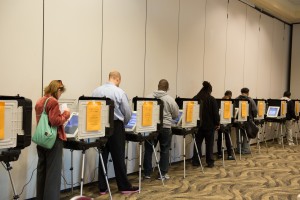Internet hackers disrupt small business
December 2, 2016

By Grace Irwin ’18
The east coast of the U.S. and west coasts of Europe underwent a mass cyber attack on Friday, Oct. 22. More than 77 sites were breached, losing companies up to $110 million. The source of the attacks are still unknown, but the FBI is working on tracking down the group responsible.
A middle-man company, Dyn, was breached with a specific malware, enabling the electronics of thousands and spreading a virus. Dyn is an internet performance company, working to make sure that websites are reached when requested and protecting online infrastructure for sites of small or home businesses. The malware reached cameras, printers, routers, and other small devices. “It’s scary to think that people can hack into system with only a small virus,” said sophomore Patrick Delehanty.
As this year’s election concluded, many worry that the hackers attempted to interfere with the polls. “People are always saying that the election was going to be rigged, but with these hackers, maybe it actually was,” freshman Sophia Hug said. Others argue that the election was doomed from the start. “The election was always rigged because the electoral college is biased” senior Danielle Vacca said.
Despite the worry, direct electron recording systems ensures that all votes are confidential and unchangeable. “I’m sure they can try to hack, but as long as they can’t reach the voting booth they can’t change the information,” said Ms. Martin, technology coordinator for the school district.
When installing viruses, hackers leave codes in internet ads, unprotected websites or any form of internet service users can click. Once the malware is installed, the server can begin to collect information such as passwords and simple key strokes.
“Most people click on something online and don’t notice it until the damage is done,” said Mr. Young, district technology supervisor.
The hacking incidents have also brought light to question of whether or not technological advancement is really beneficial or hurting society. “Physically we are in the aspect that we’re shriveling up and becoming weak sitting in front of screens all day,” junior Oliver Irwin said. “You know it’s getting bad when crisis hits over mere breaches of an internet system.”

